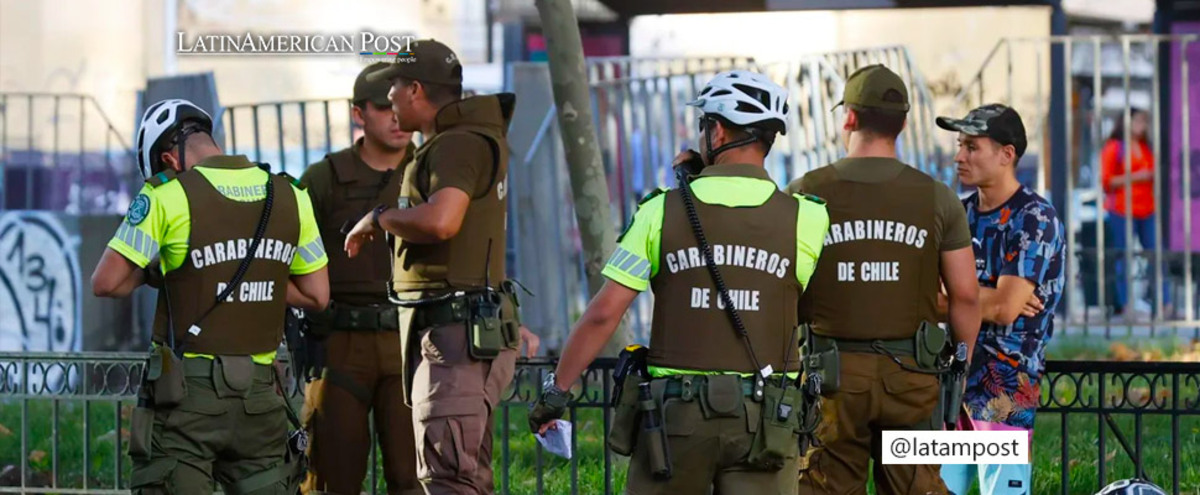Xenophobia in Chile: A Challenge for the Government of Gabriel Boric
More and more cases of xenophobia are reported in Chile, which represents a challenge for Gabriel Boric's government. How do the authorities' decisions affect this social problem?.

Photo: NTN
LatinAmerican Post | Christopher Ramírez Hernández
Listen to this article
Leer en español: Xenofobia en Chile: un reto para el gobierno de Gabriel Boric
On May 19, the Colombian media reported the murder of Milton Domínguez, a Colombian citizen living in Chile for several years. The Colombian, born in Cali 61 years ago, was allegedly the victim of a severe beating by members of the Chilean Navy, who attacked him to death in the city of Iquique.
"According to the evidence and the prosecutor in the case, the Chilean Navy officers involved are already in preventive prison in Iquique," said Nancy Domínguez Moreno, sister of the victim, in conversation with Caracol Radio. This, despite the progressive government of Gabriel Boric.
For Domínguez, the death of his brother "is an act of xenophobia (hatred of foreigners)," a situation that is not new in the southern country.
According to the Chilean National Institute of Statistics (INE), the foreign population residing in Chile reached almost 1.5 million people by 2021. Citizens from Venezuela, Peru, Haiti, Colombia, and Bolivia have the most prominent presence in Chilean territory.
Migration, already considered a social problem in Chile, has brought a xenophobic spirit to the country that mainly affects Venezuelan citizens. This is why the action of Gabriel Boric and the entire state apparatus is essential.
Some of the most notorious cases involve groups of people who go directly to Venezuelan migrant camps (especially in Iquique, a city very close to the border with Bolivia) to destroy them. Between the end of 2021 and the beginning of 2022, two such cases ended with the burning of foreigners' tents, mattresses, and other belongings.
The Fault of the Authorities?
However, what appear to be isolated cases can also be taken, according to several experts, as a response to the inability of the government and other state authorities not to increase hatred towards the migrant population. They would have caused quite the opposite.
For the Minister of the Interior, Carolina Tohá, it is perilous for the Public Prosecutor's Office to publish photos of alleged foreign criminals in Chile and, even worse, to ask the public for help locating them. "We must be very cautious with this, especially in cases where there has not yet been a sentence and the investigative processes have not been concluded," said Tohá.
Also read: Crisis in Haiti: a Political, Human Rights and Security Problem
He also explained that "there are risks that the behavior of people of one nationality may become generalized with this type of criminal acts and that cases of xenophobia may arise. In Chile, hundreds of thousands of Venezuelan men and women live, the vast majority of them integrated into society and working. They cannot pay for the broken dishes. We must always avoid these stigmatizations".
However, the debate was more profound and more controversial when the Prosecutor's Office announced that there would be preventive detention for all migrants who are detained and whose status is undocumented. According to the national prosecutor Angel Valencia, this measure is taken not to hinder investigations related to a person who cannot prove his identity in the country.
Of course, opponents were not long in coming, accusing that this type of measure not only stigmatizes a specific social group, but also gives rise to institutionalize racism and xenophobia, taking it to state levels.
This was stated by the Latin American Council of Social Sciences (CLACSO), represented by its Working Group on Migration and South-South Borders. Through an official communiqué, this group of academics stated that imprisoning all undocumented migrants without cause violates their human rights and calls into question the internal organization of the Chilean State.
For this group, it is clear that currently, there are "slow processes for processing migratory documentation, which generate a significant number of people in a situation of administrative irregularity, waiting for the corresponding State institutions to respond to their visa applications or their self-denunciation processes for entry through an unauthorized passage, to be entitled.
In short, for CLACSO, it was evident that this measure could put at risk the dignity and freedom of innocent victims of the inoperative and slow bureaucracy of the Chilean State.
Amnesty International shares the same opinion. This non-governmental organization regrets that "the Chilean State has not complied with its obligation to protect those who left Venezuela to protect their lives (…) Without options to regularize their migratory situation, Venezuelan people in Chile are condemned to a situation of absolute lack of protection".
Xenophobia or Hatred of the Poor?
Another organization that spoke out against these acts of racism and xenophobia was the UN, through its office in Chile. This international entity assures that Chilean authorities are not guaranteeing "adequate respect for the human rights of all people to live a life free of violence."
However, one of the essential points they highlighted is that most hate cases were against the poorest migrants. According to the director of Fundación Interpreta, Tomás Lawrence, this shows that discrimination is a little more classist than nationalist.
"What happens within what we observe is that people are not bothered by the migrant because of his nationality. They are not bothered by the fact that they are Venezuelan, Colombian, or of another nationality. They are bothered by the fact that they are poor, and that is where this aporophobia, which is not xenophobia per se, is generated," said Lawrence.
However, according to Lorena Zambrano, leader and member of the Association of Migrants and Promigrants (AMPRO), this stems from Chileans' fear "of going back to the times of the dictatorship when there was a lot of poverty. They relate it to that, as if migration is going to impoverish Chile". Can migrants impoverish an entire nation?





